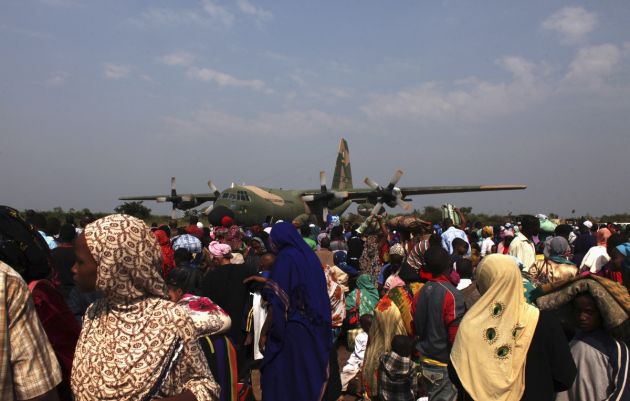Hundreds try to flee Central African Republic on emergency flights

BANGUI (Reuters) - Hundreds of people tried to flee inter-religious violence in Central African Republic on Saturday aboard emergency flights to neighboring Chad, while nearby countries appealed for help to rescue their citizens from the mounting humanitarian crisis.
Tit-for-tat violence between Muslim Seleka rebels, who seized power in March, and Christian self-defense militias have killed more than 1,000 people this month in the riverside capital Bangui and displaced hundreds of thousands more.
Fighting in the former French colony has surged in recent weeks despite the presence of 1,600 French peacekeepers and nearly 4,000 African Union troops deployed under a U.N. mandate to protect civilians. Bangui was calm on Saturday.
The 'anti-balaka' militia have targeted Muslims they say have supported Seleka during months of looting and killing since March. With many Seleka gunmen coming from Chad, its citizens in particular have been singled out, prompting their government to charter flights this week to bring them home.
However, many of those who waited in the heat at Bangui airport were Muslim Central Africans who said they were fleeing their majority-Christian homeland for fear of reprisals.
"We have never known violence as barbaric as this," said Aishatou Abdelkarim, 31, who said she was married to a Chadian. "The devil has taken control of our country."
Chad's Foreign Minister Moussa Faki said some 4,000 Chadians had been transported home so far, many of whom had lived in Central African Republic their whole lives. That is just a fraction, however, of the hundreds of thousands of Chadians living in landlocked Central African Republic.
More than 800,000 people have fled their homes during this month's fighting, with about half of them seeking refuge in Bangui, the United Nations says. It appealed on Friday for $152 million to help meet emergency humanitarian needs such as drinking water and sanitation in makeshift camps.
Tens of thousands of people have sought safety at the international airport, where French peacekeepers have a base. Women and children waited beside piles of suitcases and bags.
Cameroon flew home 214 of its citizens on Friday, bringing the number evacuated this month to 926, state radio there reported. Senegal and Niger, meanwhile, have asked the International Organisation for Migration (IOM) for urgent help in extracting hundreds of their own expatriates.
CONGOLESE KILLED
Many say the bloodshed has little to do with religion in a nation where Muslims and Christians have long lived in peace. Instead, they blame a political battle for control over resources in one of Africa's most weakly governed States.
"We used to live in perfect harmony with the Christians but it is Seleka and the anti-balaka who are trying to divide us," said Issa Baro, a 35-year-old Muslim trader from Chad, waiting to catch a flight home.
Chad's Foreign Minister Faki said toppled President Francois Bozize was responsible for the surge in violence in recent weeks and was using the anti-balaka to undermine interim President Michel Djotodia, Seleka's leader.
French President Francois Hollande told U.N. Secretary Ban Ki-moon by telephone on Friday he wanted greater U.N. involvement in Central African Republic. Ban is preparing a proposal for a possible U.N. peacekeeping mission.
Two Congolese peacekeepers were killed when they were attacked by unidentified gunmen late on Thursday, a day after six Chadian peacekeepers were killed, a spokesman for the African Union's MISCA peacekeeping mission said.
Two French soldiers were also shot dead in early December.
(Additional reporting by Serge Leger Kokpakpa; Writing by Daniel Flynn; Editing by Erica Billingham)